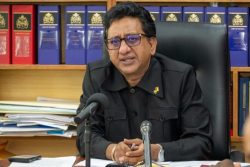It is perhaps a measure of how polarized the society has become that much of the language which is being bandied about in the political arena and by commentators is so immoderate. Of course the government itself is not a shining example of how to conduct a civil debate, scattering words like “terrorist” about with more liberality than judgement. Intemperate language inevitably means intemperate allegations, and once that habit becomes entrenched, both sides will be deaf to rational argument and the kind of meaningful discussion which might advance understanding and be conducive to compromise. In fact, it is possible that even without any deeds we could simply talk ourselves into dancing in the shadows of the danger zone.
There may be a few on the one side of our political divide who give the impression they think that direct confrontation would be the solution to their problems, and one suspects they may have their counterparts on the other side too, even although such people may not express themselves publicly. Where there is frustration because no obvious avenue for change presents itself, impatience becomes the driving sentiment, and inevitably people look for short cuts. The problem is that history will not be rushed, and violence is rarely a successful short cut. It certainly will not be so in this instance; it will simply produce anarchy, suffering, bloodshed and bitterness – not a resolution. In such circumstances the same tools in the end would have to be employed to restore tranquillity to a ravaged nation as exist at present.
Some of the words currently being exchanged are at best carelessly used and at worst abusive, and lead to all kinds of extravagant assumptions about motive, rather than dealing with an argument per se. As far as the two main political parties are concerned, it has to be said that after forty-two years of independence neither of them really could claim to occupy any moral high ground. The main difference is that most of the larger issues which the PNC has to face up to are in the past, while those of the PPP/C administration are current. The commentators on both sides conveniently forget the totality of our post-independence history, and simply home in on the portion which best accords with their feelings. The lesson is, however, that any government which is associated primarily with one ethnic group will be seen as lacking legitimacy by a significant portion of the opposition.
Never mind its majority at the polls, some of the present government’s problems arise from its obsession to control every facet of life in this country, and not leave the opposition room to move, even in areas of local government where its supporters may predominate. The consequence has been a feeling that any independent thought and creativity are being stifled, and by extension in the case of the opposition, the perception that their group is being excluded from the life of the nation. The language, albeit unhelpful, emanating from some commentators is in part a reflection of the extreme frustration felt. Both sides then come to see things in absolutes, and anyone who attempts to see shades is pigeonholed as belonging to one side or the other, and condemned.
The administration suffers from the arrogance associated with being too long in power, as evidenced by a lamentable lack of punctiliousness in relation to accountability and transparency. It simply does not think it has to account to anyone, and that is inevitably an attitude which will facilitate corruption.
As the authorities become more arrogant and more unresponsive to what goes on around them, the public conversation is notched up a few decibels.
As always happens with those who make themselves overly comfortable in the cabinet room, they lose touch with the people – even their own constituency – and are particularly deaf to what an opposition constituency is saying and feeling. There are, of course, the irrelevant ruminations of Dr Misir, which may be persuasive to the ears of some PPP/C supporters, but could hardly be expected to make a positive impact on those whose loyalties lie elsewhere. And this deafness on the part of the governing party in the current circumstances is dangerous; it doesn’t matter what Dr Misir argues is or is not the case, but the strength of feeling among those who are alienated from the government and alienated from the system does matter and should not be ignored.
To date the government has shown no capacity to address specific issues across a range of fronts with the opposition. When under enormous pressure, as happened following the Lusignan and Bartica killings, there will be consultations – in that instance on crime. However, when the sense of urgency recedes, consultations get forgotten about again. After more than fifteen years this closed approach to government is not working; it did not work in the past, and it will not work in the future.
Of course, the main opposition too has to devise goals and work out long-term strategies to reach those goals, which would allow it to accommodate itself comfortably within a democratic framework. Changes in the major features of the political landscape will take time and sustained work to achieve, and the situation at any given point will need careful assessment.
While at the moment we are still in deadlock mode, it would do well for commentators on both sides of the divide to remember the experiences of the two groups under the PPP as well as the PNC governments, to get things in perspective. It takes effort to understand another group’s fears and sense of being on the outside politically. The rhetoric of many of our politicians has done us no service, and now the language of some of our commentators is also inhibiting rational exchange. And above all else, talking to each other is what we need to keep doing.









